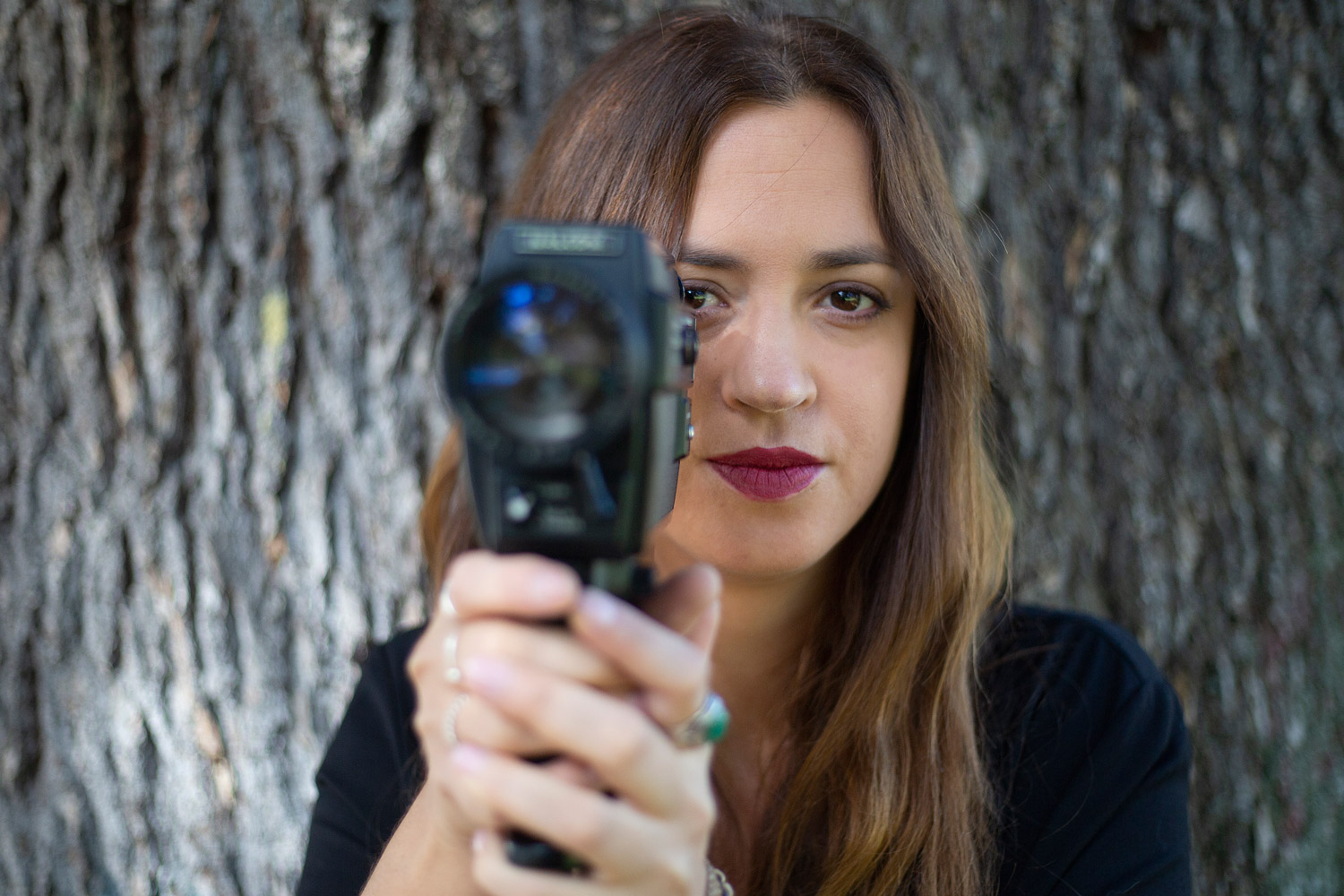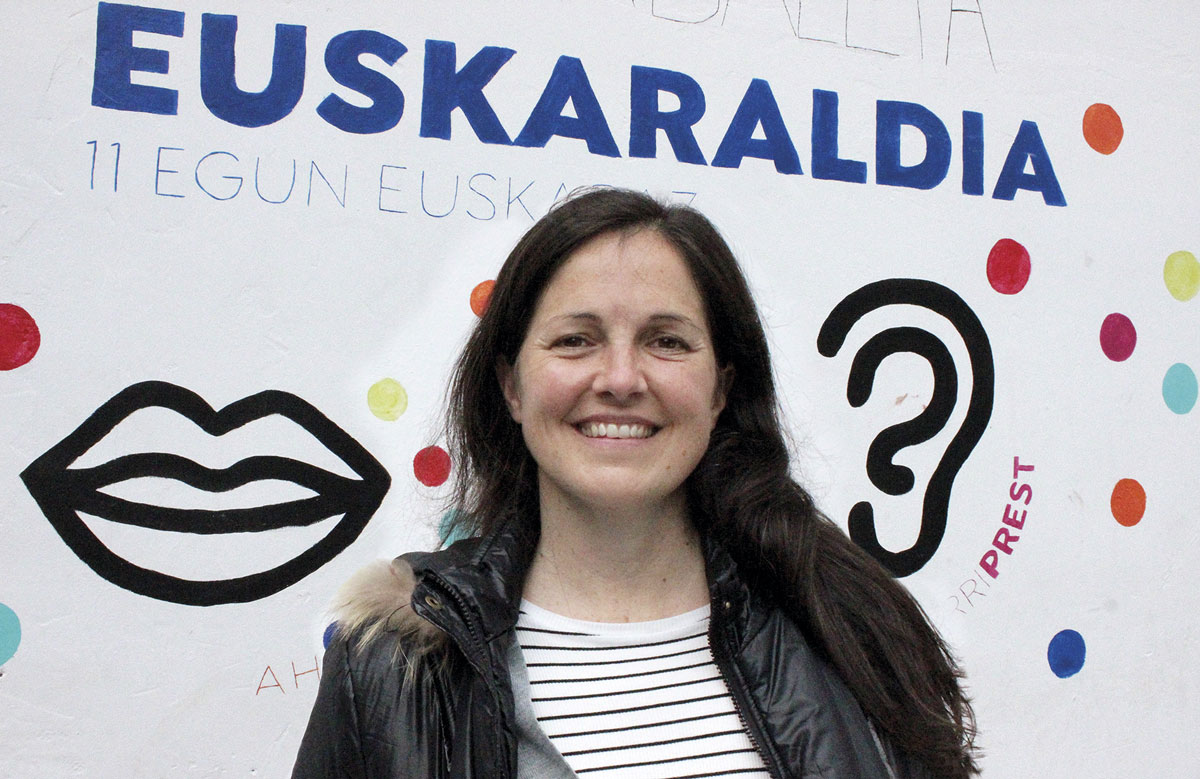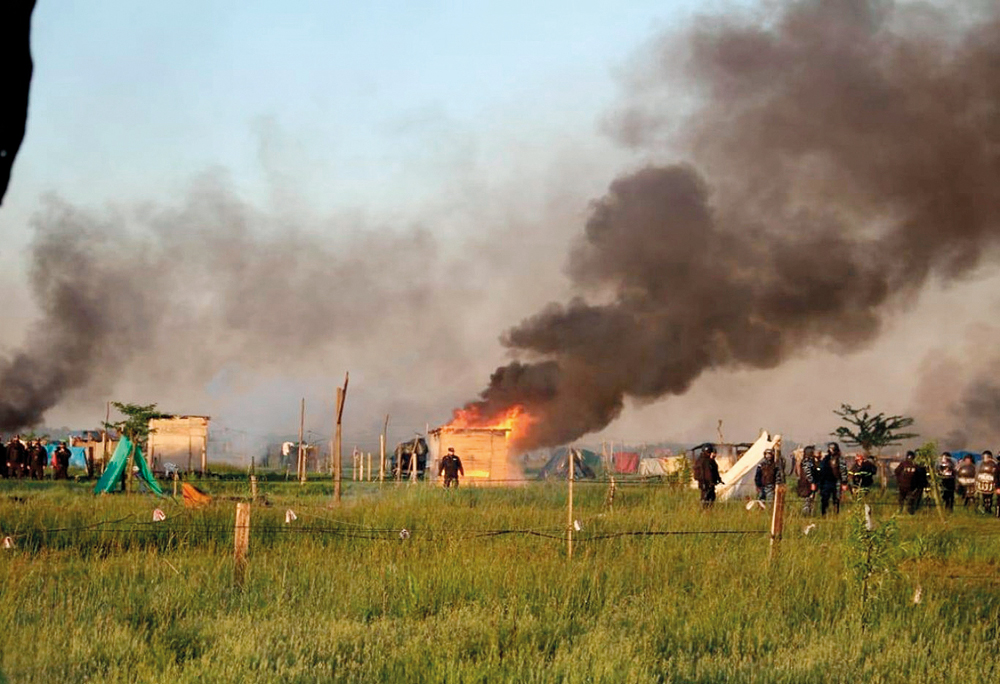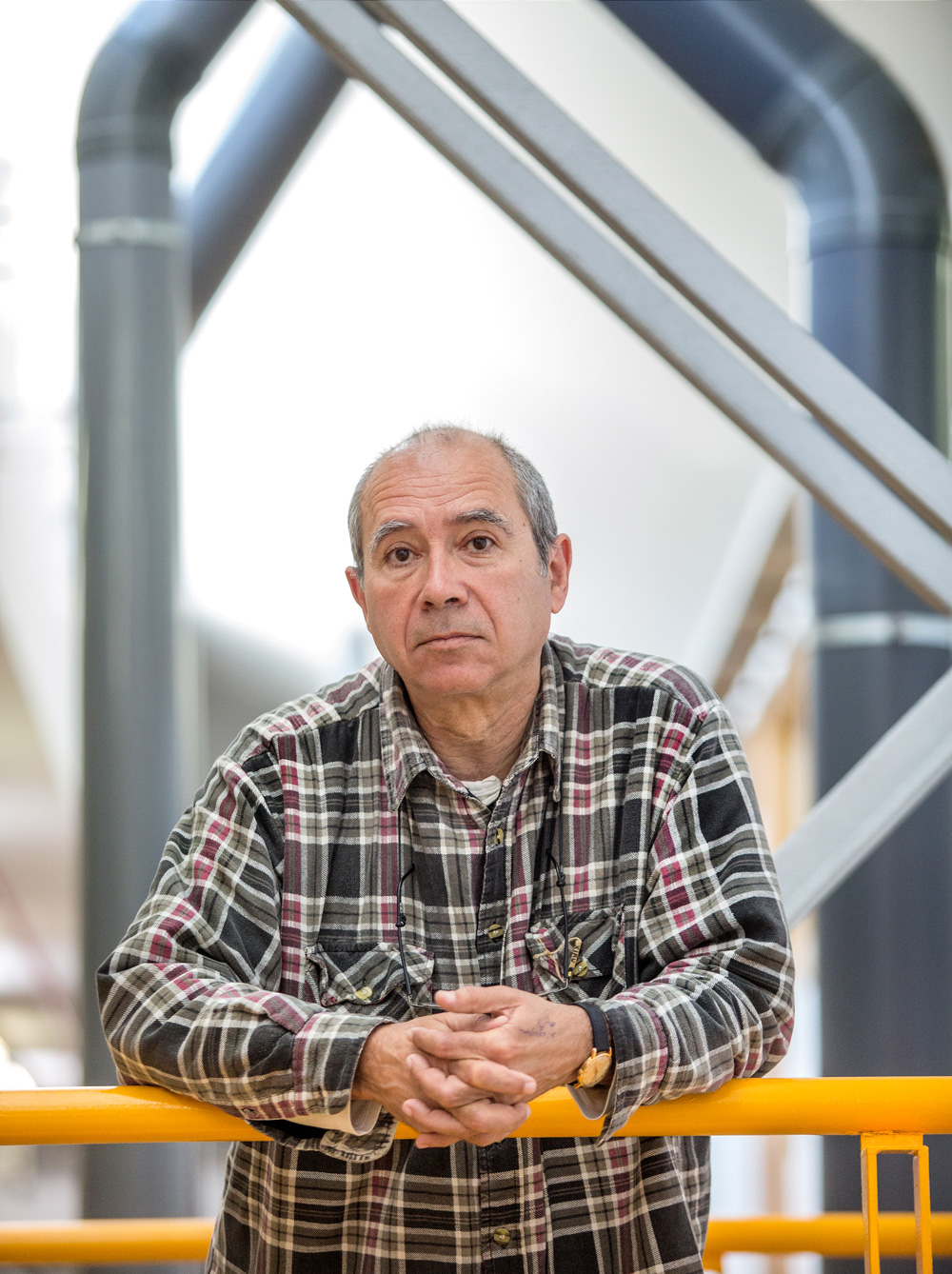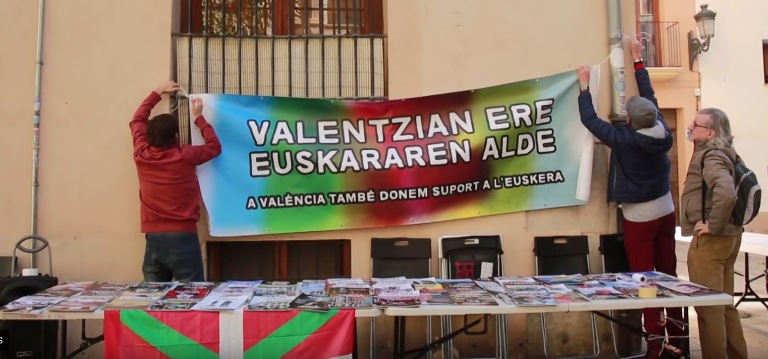"I tell the stories I've heard in Caracas and I cry."
- He says that he is the daughter of the diaspora, but far from saying ‘I am not from here’. As present as those here is the one born in Caracas. The family of Miren, the Basque daughter of the diaspora, lives from the same feeling, in which the promoters of the old nationalism of Donostia appear.
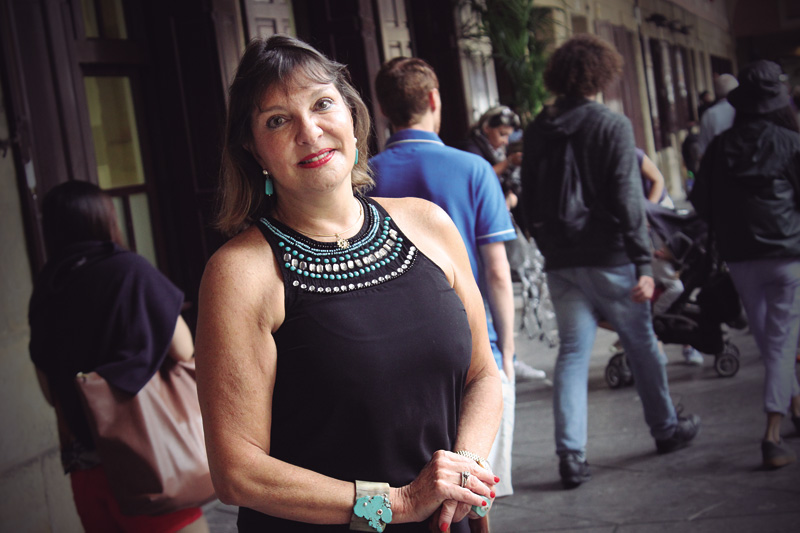
I’ve been ordered to speak with you, but I don’t know where the thread of this conversation begins… I’ll explain
it to you. In the Old Part of San Sebastian, I walked into a shoe store. I don't know what the shopkeeper's inclination is, but his family is a patriot. I usually say that life is circular. You don't know why, but once time has passed, life leads you to place yourself where you were before. Anyway, go into the store, pick a pair of shoes, tie the word, ask the name, look at Olasagasti, and no! People break the schemas, the Venezuelan accent when I speak and give my name to Miren Olasagasti. People consider me a foreigner, but there are no, I have two great loves in my life, San Sebastian – Euskal Herria in general – and Venezuela. “Olasagasti, yes. I am the daughter of the diaspora.” The merchant was astonished, Miren Olano, and, no doubt, she has given you my news so that the story of the family is not lost.
What's your story?
The grandfather was Donostiarra, Juan Olasagasti Azkue, who had left for Venezuela in 1939. Three years later, in 1942, my father left, Iñaki Olasagasti Alkain. As I heard at home, my grandfather was one of the first nationalists in this Old Donostian Party, although my great-grandfather was monarchic, Carlist. Thus, the grandfather beat the brands at home, followed by the ideas of Sabino Arana and José Antonio Agirre. I have a picture that shows the funeral of a Republican general in times of war: there are the Republican soldiers with their fist closed and next door, Lehendakari Agirre with the hat. There's also my grandfather with his hands in his pockets. Photography has a problem, because when we saw it, grandpa had already escaped and grandma was incarcerated. Trinidad Alkain. The daughter of a cousin told me they had her in Ondarreta, but I don't know if they had her in Prim Street, where they had her or in a jail ruled by nuns. I don't know. I guess in 1938-39. Grandfather in exile and grandmother in jail lived from charity at home. Since then, Grandpa didn't want any photography or anything to be published about him.
You've talked to us about war.
Yes. When the war broke out, his grandfather went to the small cousins' house in Segura, where he took refuge. He told his cousins that this madness could not last for more than a month, that he would leave his family there and that he would go to war, but that he would return soon. Meanwhile, the order was given to seek and arrest the grandfather and, when he heard, fled to France through the Pyrenees.
Always the stories of war.
I don't know how long the family was in Segura, but I can't be there three years! On one occasion, Grandma returned to this house in San Sebastian, and by then Uncle Manuel had also been at war and had returned to San Sebastian: he lived on the fifth floor of the house. A piece of the house was taken away and hid in it. He lived there. When it was known that they came to look for him, he escaped from the roof to the roof… I have heard similar stories from my father’s mouth, and I did not tell them many times, because he was very excited.
You've heard stories in Venezuela.
Because his grandfather went to Venezuela, like many Basques of that time. The Government of President Medina Angarita gave way to the Basques, with or without documentation, and the Basques. Grandpa was not captured, but in return they wanted to punish their children. His brother Joseba, for example, was sent to the Foreign Legion fighting for the war in Morocco. In order for the same not to happen to my father, before the age of the mili my grandfather called Venezuela and, therefore, was considered a deserter. The rest of the family were minors: Uncle Mikel was four years younger than his father and Aunt Miren, six. This is how the father went to Venezuela.
And in Venezuela, what life do your ancestors have?
My grandfather worked here in the savings bank, and he came to Venezuela and he had to make a tent, in the Basque bar. One of those bars was called the most beautiful. The father didn't drink, he didn't know what to do in the bar, but he made a little booklet to know how to make cocktails and drinks. It was his first job in Venezuela. He later worked as an administrator of several wealthy families. He worked for the Mendoza family, the owner of the Polar brewery, today a large food company very much persecuted by the current regime, and also for the Velutini, builders of complicated houses. His grandfather worked as a accountant until 1950.
And his father?
In 1943, my father met my mother. East of Venezuela, working in pipelines to the city of Cumana. The father, eighteen years old, the seventeen mothers, joined him as soon as they met him. Her mother was awesome, a beautiful, beautiful, quiet girl… Her father, however, was a nineteen-meter man – long, long, they were called in the Old Part of San Sebastián – capable of stepping the world. They got married in 1950, because until then their father had worked subsidizing the family here. In fact, I intended to bring the two brothers here to Venezuela and take them. Aunt Miren -- Look at Koruko, actually -- stayed here, because she was sick, next to her mother. The father took these two brothers to Venezuela in 1948, when the misfortune has occurred.
A disgrace?
Yes. Also his brother from the Foreign Legion, Uncle Joseba, started working as an accountant in a well-known Venezuelan family and one of his daughters fell in love with his uncle. But my uncle had a girlfriend here, and that obsessed Venezuelan girl killed his uncle Joseba six months after he arrived in Venezuela. It was a great pause. The first page of the newspaper was news. Years later I found out what had happened to my uncle, looking for old papers. I read “Murder of passion.” The girl was a wealthy family, and she opened a version like this. My uncle's death caused a great stir in the family, because the father was already on a trip with a young Venezuelan, and after that they thought there was nothing to do about walking with girls here. On the other hand, for our mother's family, the foreigner was not the most appropriate option for marriage. However, the story had a happy ending as far as my parents are concerned, even though they had to have lived through a very hard and complicated time.
You say that Father Cumana went to work.
Yes. They were working in the heart of the Venezuelan jungle, channeling the Guanare River and building bridges over it, in a work for the Ministry of Public Works. While he was there, his father fell ill, was caught with yellow fever. The disease was called “economic” because there was no money to spend on medicines and people died without medicine. However, a doctor made him live and saved his father, a 21-year-old boy. His father was thankful since then to the doctor, Dr. Asuaje, and later, despite going to live in Caracas, he visited the doctor every year from the capital to the state of Apure.
What was my youth father telling you here?
I remember once, while I was asleep, I heard shouts. My mother then moved the father to wake up, and I know what my father said to him: “Thank you, Mom, you saved my life. They were shooting at me." According to his father, Uncle Manuel, hidden in the loft of this house, he sent his father to seek news that came through the English, a younger brother than Manuel himself. The father wore the news in his boots before the troops called them home. In return, my uncle would tip him. The father said he had stayed several times buying a candy at a pastry shop near Barandiaran, without realizing that he had been called home and that at some point he had been caught or beaten. On another occasion, his father told how Franco's troops entered San Sebastian and emptied the weaponry in the Plaza Mayor. He had marched with his friends to the nuns' garden, as if he were to steal apples, but the baker realized he was following her. In Plaza Mayor, where the troops had disarmed, they had captured grenades, believing they were flares or rockets, and they had returned to the nuns' garden, throwing grenades. What are the old children! They had no conscience! Since then, I've seen an image at the San Telmo Museum, "Children Playing War." Well, that's what his father was about.
I had things from here.
There, here, here. In Caracas he was wired, stories were crossed and braided… On 30 October it was held in Caracas. When my son Iñaki was young, he grabbed the 28 children of his class and brought them home, in the afternoon snack. My father, always the same question. “Are there Basques in José Iñaki’s room?” “Yeah, I guess! At least one of the boys is called Patxi. But you don’t know, it’s a very weird people!” The child's father was called Patxi Badiola. It wasn't strange that the family closed. And my father said, “I have to be with that Patxi, I met his grandfather in Donostia.” It seemed amazing, but it was. He went to Patxi Badiola because he's my father and he told him that he had met my father. Patxi said no: “It’s impossible. My father died a long time ago. At best, you will have known the father of another Badiola who lives in Caracas.” My father insisted. “No, no, I met your father. Moreover, I was there the day your parents met: it was a holiday, and your father and I went to eat a hamlet. Then the daughter came out of the house, fifteen years old, and your father liked it and told her that she would marry her. The girl looked at him scared and ran to him, telling him that he wouldn't marry him. Years later, Patxi returned to the farmhouse, conquered and married his mother Mentxu.” He even described such Mentxu.
Amazing historical stories in exile.
The conversation didn't end there. The fact is that the Mentxu family was also Donostiarra, the Old Party. “10. I guess they lived in the number. They were Pagola Barandiaran.”
His father changed his face color, he palliated, and then the man on the 90th Meter wept. He had cried and wept! “What do your father have?” I asked him, and his answer: “Mrs. Barandiaran, she gave us food when we had nothing to eat.” Here's the closed circle again.
And today, what are those experiences and memories?People
here suffered a war trauma that could not be otherwise. Many left, many stayed. In my opinion, those who stayed here evolved over time, and somehow history came to internalize. On the contrary, the people who had to flee lived as if they had been pulled out of their mother’s land. These people lived in a different context, but inevitably, the elements that characterized it reappeared. And the rupture and the rupture were renewed. To begin with, I tell stories that I have heard in my home in Caracas. And when I tell them, I get tears. I revive the experiences of my predecessors. The merchant Miren Olano told me that you can't miss those testimonies, and the man tells me to write, but I don't have capacity, I'm an architect, I'm not a writer, I'm not a journalist. So I told my son what I'd heard so they don't get lost. I can tell your story to pay tribute to those who are not among us.
Arkitektura ikasketak egina. Donostiarra zuen aita, gerra ondoan Venezuelara joan eta bertan ezkondua. Hiru urte zituela egin zuen Mirenek lehen bidaia Donostiara, eta bizialdiak eginak ditu bertan. Honenbestez, Euskal Herriari zinez lotua. Caracasen ere euskal etxean ohi zen Miren larunbatero, ikastolan, esaterako. Igandeetan, aldiz, tiro-poligonoan, aitaren ondoan, ez alferrik izan baitzen Iñaki Olasagasti Alkain Munduko txapeldunorde plater-tiroko eskeet modalitatean Egipton eta Alemanian, 1961ean. Venezuela ordezkatzen zuen.
“Nire azentua aditu eta harritu egiten da jendea, baina hau nire herria da. Donostiara baino lehen, Hondarribira heldu eta malkoa irteten zait. Bizipen mordoa dut hemen, hiru urte nituela egin nuen lehen bidaiatik honakoak. Emozioak borborka hasten zaizkit eta, orduan, atzerritartzat hartzen nautela ikusten dudanean, esaten dut: ‘Jainkoarren!, hemengoa naiz, zu baino hemengoagoa, nahi baduzu!’”.
“Birraitonarena zen etxe hau, Donostiako Kale Nagusiko 9.ean, goitik hasi eta beheraino. Zurgindegia zuen etxepean, tailerra. Uste dut 1850ean erosi zuela etxe osoa. Jose Mari Olasagasti Aiarragarai birraitonak lau seme-alaba izan zituen. Zaharrena zen Ramon, zurgindegian aitarekin lanean. Bigarrena zen osaba Manuel, donadoa. Hirugarrena zen Jabier, Donostiako zinegotzi izan zena 1919an, Dolores Rodriguez Galekin ezkondu zena. Gazteena izan zen gure aitona, zurgindegian lan egin ez zuena, eta aldiz, politikan muturra sartu zuena”.
“1943tik 1948ra bitartean aitak amari idatzitako 23 eskutitz dauzkat gordeak. Eskutitz ezinago erromantikoak, bistan da, eta aldi berean, libertigarriak, jostari eta errealistak.
Oso reality-ak ere bai”.
Euskal jatorriko 37 gazte estatubatuar Euskal Herria ezagutzen eta euskara ikasten aritu dira uda hastapenean.
San Frantziskoko Euskal Etxeak 40 urte bete ditu asteburu huntan.
I have received an email from Brazil. These are words of beasaindarra Estebe Ormazabal Insausti, a subscriber of ARGIA. It's not the first person living abroad that we've brought to this corner. Little by little we are collecting the opinions, reflections, criticism and praise of... [+]
San Vicente barrutia (Argentina), 1934ko maiatzaren 18a. Mathilde Díaz Vélez lurjabeak Buenos Airesetik 40 kilometro ingurura zeuden bere lursailetan Guernica izeneko herria fundatzeko eskaera helarazi zion Buenos Aires probintziako Obra Publikoetako ministroari,... [+]












